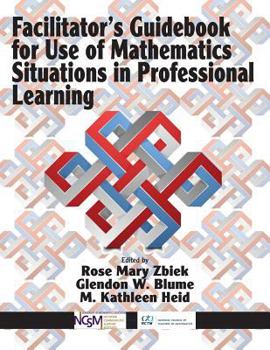Facilitator's Guidebook for Use of Mathematics Situations in Professional Learning
The depth and breadth of a mathematics teacher's understanding of mathematics matter most as the teacher engages in the daily work of teaching. One of the major challenges to teachers is to be ready to draw on the relevant mathematical ideas from different areas of the school curriculum and from their post-secondary mathematics experiences that can be helpful in explaining ideas to students, making instructional decisions, creating examples, and engaging in other aspects of their daily work. Being mathematically ready and confident requires teachers to engage in ongoing professional learning that helps them to connect mathematics to events like those they live on a daily basis. The purpose of this volume is to provide teachers, teacher educators, and other facilitators of professional learning opportunities with examples of authentic events and tools for discussing those events in professional learning settings.
The work shared in Facilitator's Guidebook for Use of Mathematics Situations in Professional Learning resulted from a collaborative effort of school mathematics supervisors and university mathematics educators. The collaborators joined their varied experiences as teachers, coaches, supervisors, teacher educators, and researchers to suggest ways to scaffold activities, encourage discussion, and instigate reflection with teacher-participants of differing mathematics backgrounds and with varying teaching assignments. Each guide has ideas for engaging and furthering mathematical thought across a range of facilitator and participant mathematics backgrounds and draw on the collaborators' uses of the Situations with in-service and prospective teachers.
The events and mathematical ideas connected to each event come from Situations in Mathematical Understanding for Secondary Teaching: A Framework and Classroom-Based Situations. A Situation is a description of a classroom-related event and the mathematics related to it. For each of six Situations, school and university collaborators developed a facilitator's guide that presents ideas and options for engaging teachers with the event and the mathematical ideas. The volume also contains suggestions for how teachers and others might develop new Situations based on events from their own classrooms as a form of professional learning. Both teacher educators and school-based facilitators can use this volume to structure sessions and inspire ideas for professional learning activities that are rooted in the daily work of mathematics teachers and students.





